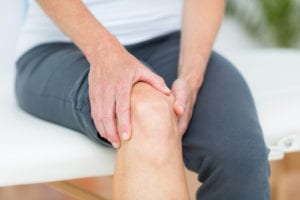Written by Jessica Patella, ND. A three-month daily intake of both high and low dose bio-optimized Curcuma longa extract significantly reduced osteoarthritic knee pain in participating subjects.
 Due to the aging population osteoarthritis is increasing globally, effecting 240 million people worldwide, about 10% of men and 18% of women 1-3. This is a concern because due to the pain and decreased mobility associated with osteoarthritis it can result in a sedentary life with increased morbidity and mortality, yet many drugs for osteoarthritis have a host of side effects and only address the pain and do not improve the disease process 1,4,5. The first study of its kind has found supplementing Curcuma longa extract to improve osteoarthritis of the knee 1.
Due to the aging population osteoarthritis is increasing globally, effecting 240 million people worldwide, about 10% of men and 18% of women 1-3. This is a concern because due to the pain and decreased mobility associated with osteoarthritis it can result in a sedentary life with increased morbidity and mortality, yet many drugs for osteoarthritis have a host of side effects and only address the pain and do not improve the disease process 1,4,5. The first study of its kind has found supplementing Curcuma longa extract to improve osteoarthritis of the knee 1.
Curcuma longa is the primary constituent in turmeric root and has been shown in previous studies to decrease inflammation and bind free radicals 1,6. Previous studies have also shown Curcuma longa to be as effective as non-steroidal anti-inflammatory drugs (NSAIDs) but without the gastrointestinal side effects 1,7.
The study included 150 participants (45-80 years of age) with symptomatic osteoarthritis as diagnosed by a physician based on the criteria by the American College of Rheumatology 1. Participants were randomly assigned to one of the following three groups: placebo (n=47, 3 caps, twice a day), low-dose Curcuma longa (n=49, 2 caps + 1 placebo, twice a day) and high-dose Curcuma longa (n=54, 3 caps, twice a day). Each Curcuma longa capsule contained 46.67 mg of Curcuma longa.
Blood levels of Coll2-1 (sColl2-1) were measured as a marker of cartilage breakdown. sColl2-1 is a specific amino acid sequence located in type II collagen and is present in the blood when cartilage is broken down 1. The Visual Analog scale was also used to assess the participants’ subjective measure of pain due to the osteoarthritis 1.
After 3-months of supplementation the following results were observed:
- Low and high-doses of Curcuma longa showed a greater decrease in the Patient Global Assessment of Disease Activity than placebo
- Blood levels of sColl2-1 showed in the placebo and low-dose groups, but not in the high-dose group, indicating a decrease in cartilage breakdown in the high-dose group.
- Pain reduction was greater in the low and high-dose groups than in placebo (p=0.018).
- There were no serious adverse events, although there were more mild adverse events in the high-dose group compared to the placebo group (p=0.012).
These results are the first randomized clinical trial with Curcuma longa and support previous studies. Daily intake of 186.6 mg/day of Curcuma longa in patients with symptomatic osteoarthritis of the knee, led to a reduction in pain superior to placebo and a decrease in the breakdown of cartilage fibers 1. Due to the safety profile of Curcuma longa, researchers state that it is a beneficial option compared to NSAIDs and should be considered for a larger clinical trial 1.
Source: Henrotin, Yves, Michel Malaise, Ruth Wittoek, Kurt de Vlam, J-P. Brasseur, F. P. Luyten, Q. Jiangang et al. “Bio-optimized Curcuma longa extract is efficient on knee osteoarthritis pain: a double-blind multicenter randomized placebo controlled three-arm study.” Arthritis research & therapy 21, no. 1 (2019): 179.
© The Author(s). 2019 Open Access This article is distributed under the terms of the Creative Commons Attribution 4.0International License (http://creativecommons.org/licenses/by/4.0/), (http://creativecommons.org/publicdomain/zero/1.0/
Click here to read the full text study.
Posted February 11, 2020.
References:
- Henrotin Y, Malaise M, Wittoek R, et al. Bio-optimized Curcuma longa extract is efficient on knee osteoarthritis pain: a double-blind multicenter randomized placebo controlled three-arm study. Arthritis research & therapy. 2019;21(1):179.
- Zhang W, Nuki G, Moskowitz R, et al. OARSI recommendations for the management of hip and knee osteoarthritis: part III: Changes in evidence following systematic cumulative update of research published through January 2009. Osteoarthritis and cartilage. 2010;18(4):476-499.
- Nelson AE. Osteoarthritis year in review 2017: clinical. Osteoarthritis and cartilage. 2018;26(3):319-325.
- Mendy A, Park J, Vieira ER. Osteoarthritis and risk of mortality in the USA: a population-based cohort study. International journal of epidemiology. 2018;47(6):1821-1829.
- Hochberg MC, Altman RD, April KT, et al. American College of Rheumatology 2012 recommendations for the use of nonpharmacologic and pharmacologic therapies in osteoarthritis of the hand, hip, and knee. Arthritis care & research. 2012;64(4):465-474.
- Buhrmann C, Mobasheri A, Busch F, et al. Curcumin modulates nuclear factor κB (NF-κB)-mediated inflammation in human tenocytes in vitro role of the phosphatidylinositol 3-kinase/akt pathway. Journal of Biological Chemistry. 2011;286(32):28556-28566.
- Bannuru RR, Osani MC, Al-Eid F, Wang C. Efficacy of curcumin and Boswellia for knee osteoarthritis: Systematic review and meta-analysis. Paper presented at: Seminars in arthritis and rheumatism2018.

